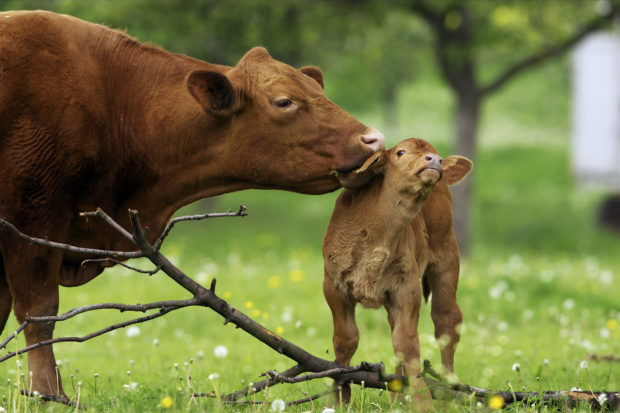
The organics rule covers an array of housing, husbandry, and other animal-care protocols for animals raised under the “organic” label, strengthening nebulous and weak standards for “organic” milk, meat, and eggs that have been in place since 1990. Photo by iStockphoto
Today, The HSUS is suing the U.S. Department of Agriculture for working to scuttle the Organics Livestock and Poultry Practices Rule – one of the most important rules to ever come out of a federal agency, affecting the well-being of tens of millions of animals each year. The USDA finalized the rule in January 2017, after a decade of input from thousands of organic producers and consumers, and in doing so, it put the nation on a path to have rigorous and comprehensive standards for cows, pigs, chickens, and other farm animals raised under the organic seal.
The organics rule covers an array of housing, husbandry, and other animal-care protocols for animals raised under the “organic” label, strengthening nebulous and weak standards for “organic” milk, meat, and eggs that have been in place since 1990. Besides limiting tail docking and beak clipping, the rule that the USDA made final in January 2017 would also require animals to have year-around access to the outdoors, and would stipulate that the indoor space is sufficiently large to allow the animals to stand up and stretch their limbs. Non-ambulatory animals, such as those with broken limbs or those too sick to move, must be medically treated, or euthanized. Animals must also be able to walk on their own before they are transported to buyers, auction houses, or slaughterhouses.
Before it was made final by the USDA, the rule attracted tens of thousands of positive comments from citizens and stakeholders, including all of the major industry players in the organics industry. Among those endorsing the organic standards was Perdue Farms, the nation’s fourth biggest chicken producer. The standards flowed from nine separate recommendations of the National Organic Standards Board (NOSB), which Congress authorized for the purpose of allowing key players in the industry to have significant input in shaping future rules for the organic label.
Not long ago, the NOSB voted unanimously to have the organics rule implemented immediately. Members of the board concluded that more consistent standards are needed to align livestock production standards with consumer expectations, a view that is supported by consumer surveys, which have found that most Americans (and 83 percent of frequent organic purchasers) say it is highly important that hens in organic farms have outdoor access. The USDA itself admits in its proposal to withdraw the rule that customers are willing to pay substantial premiums for outdoor access and other welfare standards.
This is not just about improving the lives of animals and honoring the wishes and expectations of consumers. It’s also about keeping family farmers who adhere to more humane and sustainable husbandry practices on the land, and about strengthening rural communities by giving them an opportunity to offer a value-added product for millions of consumers deeply concerned about animal welfare and wholesome food for their families. There are tens of thousands of organic producers in the market, and by differentiating their product in the marketplace by certifying that the producers don’t use hormones or antibiotics and use more humane production methods, they can command a higher price and make a better living. The producers voluntarily decide to go organic, and consumers do, too. There are no losers and no government coercion here, except some farmers who trade on the organic label and charge more for their product but don’t reach the animal care expectations to get there.
The new personnel who took over at the USDA last January, led by Brian Klippenstein who was executive director of an anti-animal-welfare super PAC called Protect the Harvest, worked almost immediately to try to scuttle the pro-farmer, pro-humane rule. They got an assist from big agricultural and foreign-owned business interests threatened by the notion that “organic” products will be perceived as superior to conventionally produced animal products. Specifically, the organics rule would force several large poultry producers to raise their animals in a manner that actually meets consumers’ expectations. Meeting consumer expectations is important since the only thing a customer may see at the grocery store is a label that states: “USDA Organic.”
Withdrawing this rule threatens to erode the integrity of the organic seal, and jeopardizes the prosperity of many rural organic farmers who pride themselves on already being capable of meeting higher standards. The fate of this rule leaves a nearly $50-billion-per-year industry with uncertainty and consumer confusion. If the USDA doesn’t restore the rule it originally adopted, organic producers will have to contemplate how else to communicate to buyers that they do not: (1) engage in inhumane practices such as debeaking and tail docking, (2) transport sick, injured, disabled, or blind animals, or (3) attempt to pass off covered porches and similar structures as true “outdoor access.”
While we file suit today, it’s also important that the USDA hear from you – that you care about animals and you care about farmers staying on the land and actually practicing animal welfare on the ground. Please take a moment to leave a comment urging the USDA to implement this rule that would finally bring the organic label in step with consumer expectations and allow a program that farmers and consumers opt into to have integrity.
The post Breaking news: HSUS sues USDA for brazen maneuver to hurt farmers and nix federal farm animal welfare rule appeared first on A Humane Nation.
Enviroshop is maintained by dedicated NetSys Interactive Inc. owners & employees who generously contribute their time to maintenance & editing, web design, custom programming, & website hosting for Enviroshop.
